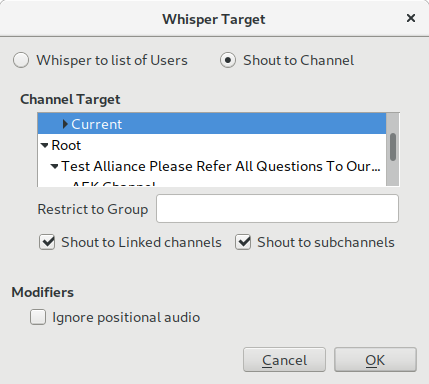Mumble definition: 1. To speak quietly and in a way that is not clear so that the words are difficult to understand. Mumble is a voice chat application for groups. It has low latency and superb voice quality, and features an in-game overlay. While it can be used for any kind of activity, it is primarily intended. Mumble - Translation to Spanish, pronunciation, and forum discussions. Inflections of 'mumble' (v): (⇒ conjugate) mumbles v 3rd person singular mumbling v pres p verb, present participle: -ing verb used descriptively or to form progressive verb-for example, 'a singing bird,' 'It is singing.' Mumbled v past verb, past simple: Past tense-for example, 'He saw the man.'
voice chat for gaming
- Mumble definition, to speak in a low indistinct manner, almost to an unintelligible extent; mutter.
- Mumble is an open source VoIP system. A VoIP server called Murmur is installed on RSS along with the Mumble client. The RigPi Audio board normally provides an input and output path for Mumble client, although USB audio sound devices or radio CODECs can also be used.
Download from PortableApps.com
Photo resizer software free for windows 7. Bsa cadet major serial numbers. Version 1.3.2 for Windows, Multilingual
12MB download / 32MB installed
Notes | Antivirus Scan | Details

Mumble Portable can run from a cloud folder, external drive, or local folder without installing into Windows. It's even better with the PortableApps.com Platform for easy installs and automatic updates.
- Support Mumble development
- Support PortableApps.com's development and hosting
Description
The main focuses of the project of Mumble's voice chat features include low latency, high audio quality, and staying backwards compatible as long as there is a considerable user-base with older versions. Mumble is customizable for different use-cases. The client features noise suppression, automatic level equalization, attenuation, priority speakers within channels, encryption, positional audio within supported games, and more.
App Notes
Note that some advanced features of Mumble require admin rights. Mumble Portable will prompt for rights on launch. Most Mumble features will work just fine if admin rights are denied or unavailable.Support
For help with this app, please see the following:
- External: Publisher Documentation
- External: Publisher Support
- PortableApps.com: Internet Support Forum
Download Details
- Publisher: Mumble Team & PortableApps.com (Mike Wodarczyk)
- Date Updated: 2020-08-24
- Date Added: 2016-11-04
- System Requirements: Windows XP, Vista, 7, 8, 10 & WINE
- App License: Open Source (MIT)
- Source: Mumble, PortableApps.com Launcher, PortableApps.com Installer
- MD5 Hash: 4a31ff2e40036e60b9d8a5a429d88fdf
- SHA256 Hash: d7201cb3b7dcb9bfb38dc39b5cc9ca7fe58005956dec41d9f4febfbbd92dc8f6
| Original author(s) | Thorvald Natvig |
|---|---|
| Developer(s) | Mumble VoIP Team |
| Initial release | September 2, 2005; 15 years ago[1] |
| Stable release | 1.3.3[2] / 4 October 2020; 2 months ago |
| Repository | |
| Written in | C++ |
| Operating system | Linux, Microsoft Windows, macOS, Android, iOS |
| Platform | Qt |
| Type | VoIP client and server |
| License | New BSD license |
| Website | www.mumble.info |
Mumble is a voice over IP (VoIP) application primarily designed for use by gamers and is similar to programs such as TeamSpeak.[3]
Mumble uses a client–server architecture which allows users to talk to each other via the same server.[4] It has a very simple administrative interface and features high sound quality and low latency. All communication is encrypted to ensure user privacy.[5]
Mumble is free and open-source software, is cross-platform, and is released under the terms of the new BSD license.
Channel hierarchy[edit]
A Mumble server (called Murmur) has a root channel and a hierarchical tree of channels beneath it. Users can temporarily connect channels to create larger virtual channels. This is useful during larger events where a small group of users may be chatting in a channel, but are linked to a common channel with other users to hear announcements. It also matches team-based first-person shooter (FPS) games. Each channel has an associated set of groups and access control lists which control user permissions. The system supports many usage scenarios, at the cost of added configuration complexity.[6]
Sound quality[edit]

Mumble uses the low-latency audio codec Opus as of version 1.2.4,[7] the codec that succeeds the previous defaults Speex and CELT. This and the rest of Mumble's design allow for low-latency communication, meaning a shorter delay between when something is said on one end and when it's heard on the other. Mumble also incorporates echo cancellation to reduce echo when using speakers or poor quality sound hardware.
Security and privacy[edit]
Mumble connects to a server via a TLS control channel, with the audio travelling via UDP encrypted with AES in OCB mode.[8] As of 1.2.9 Mumble now prefers ECDHE + AES-GCM cipher suites if possible, providing Perfect Forward Secrecy.[9] While password authentication for users is supported, since 1.2.0 it is typically eschewed in favor of strong authentication in the form of public key certificates.[10]
Overlay[edit]
There is an integrated overlay for use in games.[5] The overlay shows who is talking and what linked channel they are in. As of version 1.0, users could upload avatars to represent themselves in the overlay, creating a more personalized experience. As of version 1.2, the overlay works with most Direct3D 9/10 and OpenGL games on Windows and has OpenGL support for Linux and Mac OS X.[11] DirectX 11 game support was later added.
Positional audio[edit]
For certain games, Mumble modifies the audio to position other players' voices according to their relative position in the game.[5] This not only includes giving a sense of direction, but also of distance.
To realise this, Mumble sends each player's in-game position to players in the same game with every audio packet. Mumble can gather the information needed to do this in two ways: it either reads the needed information directly out of the memory of the game or the games provide it themselves via the so-called link plugin interface.
The link plugin provides games with a way to expose the information needed for positional audio themselves by including a small piece of source code provided by the Mumble project.[12] Several high-profile games have implemented this functionality including many of Valve's Source Engine based games (Team Fortress 2, Day of Defeat: Source, Counter-Strike: Source, Half-Life 2: Deathmatch)[13][14] and Guild Wars 2.[15][16]
Mobile apps[edit]
Mobile apps are available for Mumble, such as Mumble for iOS, Plumble for Android(F-Droid, Google Play, Note: Discontinued in 2016), and Mumla (F-Droid, Google Play).
Server integration[edit]
Mumble fits into existing technological and social structures. As such, the server is fully remote controllable over Ice.[17] User channels as well as virtual server instances can be manipulated. The project provides a number of sample scripts illustrating the abilities of the interface[18] as well as prefabricated scripts offering features like authenticating users using an existing phpBB or Simple Machines Forumdatabase.[19] The murmur server uses port 64738 TCP and UDP by default. The port number refers to the address of the reset function on a Commodore 64.
An alternative minimalist implementation of the mumble-server (Murmur) is called uMurmur.[20] It is intended for installation on embedded devices with limited resources, such as, for example, residential gateways running OpenWrt.[21] Atem software control mac.
Server hosting[edit]
Like many other VoIP clients, Mumble servers can be both rented or hosted locally. Hosting a Mumble server locally requires downloading Murmur (included as an option in the Mumble installer) and launching it. Configuring the server is achieved via editing the configuration file. The configuration file holds information for the server's name, user authentication, audio quality restrictions, and port.
Administrating the server from within requires a user to be given administrator rights, or can also be done by logging into the SuperUser account. Administrators within the server can add or edit rooms, manage users, and view the server's information.
See also[edit]
References[edit]
Mumble Downloads

Mumble Rappers
- ^'Mumble - Browse /Mumble/Mumble Client 0.1 at SourceForge.net'. SourceForge.net.
- ^'Release 1.3.3'. 4 October 2020. Retrieved 7 October 2020.
- ^'FAQ/English – Mumble'. www.mumble.info. Retrieved 2011-06-30.
- ^'FAQ/English – Mumble'. www.mumble.info. Retrieved 2011-06-30.
- ^ abc'Project of the Month, November 2009'. SourceForge.net. 2005-08-31. Retrieved 2011-06-30.
- ^'ACL and Groups/English – Mumble'. www.mumble.info. Retrieved 2011-06-30.
- ^'Mumble 1.2.4 released | Mumble'. blog.mumble.info. Retrieved 2017-09-30.
- ^'FAQ/English - Mumble Wiki'. Retrieved 2015-06-12.
- ^'Mumble 1.2.9 - Mumble Blog'. Retrieved 2015-06-12.
- ^'Features - Mumble Wiki'. Retrieved 2015-06-12.
- ^'Games – Mumble'. www.mumble.info. Retrieved 2011-06-30.
- ^'Link – Mumble'. www.mumble.info. Retrieved 2011-06-30.
- ^'Updates for Team Fortress 2, Day of Defeat: Source and Half-Life 2: Deathmatch'.
- ^'Counter-Strike: Source Update Released'.
- ^'Guildwars Website'. Archived from the original on 2017-09-22. Retrieved 2014-02-18.
- ^'Games - Mumble Wiki'.
- ^'Interview: Mumble Does OSS VoIP Chats for Online Games'. Ostatic.org. Archived from the original on 2011-07-27. Retrieved 2011-06-30.
- ^'SourceForge – mumble/mumble/tree – scripts/'. Mumble.git.sourceforge.net. Archived from the original on 2012-03-04. Retrieved 2011-06-30.
- ^'Tree for mumble-scripts in Mumble scripts'. Gitorious. Archived from the original on 2012-07-09. Retrieved 2011-06-30.
- ^'GitHub - umurmur/umurmur: Minimalistic Murmur'.
- ^'uMurmur – Howto'. wiki.openwrt.org. Retrieved 2011-10-09.
External links[edit]
- Official website